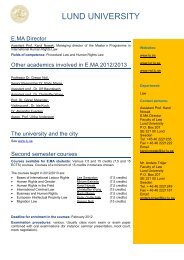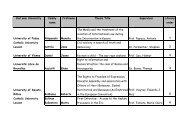study human rights mainstreaming in eu's external relations - EIUC
study human rights mainstreaming in eu's external relations - EIUC
study human rights mainstreaming in eu's external relations - EIUC
Create successful ePaper yourself
Turn your PDF publications into a flip-book with our unique Google optimized e-Paper software.
DG EXPO Policy Department<br />
2001 Commission communication argues that “To be effective, respect for <strong>human</strong> <strong>rights</strong> and<br />
democracy should be an <strong>in</strong>tegral, or ‘ma<strong>in</strong>stream’, consideration <strong>in</strong> all EU <strong>external</strong> policies.<br />
This means <strong>in</strong>clud<strong>in</strong>g these issues <strong>in</strong> the plann<strong>in</strong>g, design, implementation, and monitor<strong>in</strong>g<br />
of policies and programmes, as well as the dialogue pursued with partners both by the<br />
Commission and the Council” 54 . With an eye on the legal mandate of the EU, the 2002<br />
COHOM report <strong>in</strong>terprets <strong>ma<strong>in</strong>stream<strong>in</strong>g</strong> as “<strong>in</strong>tegrat<strong>in</strong>g <strong>human</strong> <strong>rights</strong> (understood to<br />
<strong>in</strong>corporate the pr<strong>in</strong>ciples of liberty, respect for universal and <strong>in</strong>divisible <strong>human</strong> <strong>rights</strong>,<br />
fundamental freedoms and the rule of law) <strong>in</strong>to every aspect of policy decision-mak<strong>in</strong>g and<br />
practice, with<strong>in</strong> the framework of the Treaty competency of the Union’s Institutions” 55 .<br />
As for the specific fields of <strong>external</strong> <strong>relations</strong> <strong>in</strong> which <strong>human</strong> <strong>rights</strong> are to be ma<strong>in</strong>streamed,<br />
it is evident that a major emphasis has been put on second pillar actions, and <strong>in</strong> particular<br />
the CFSP, which broadly <strong>in</strong>cludes bilateral agreements with third countries and EU<br />
diplomatic action <strong>in</strong> multilateral venues, especially the UN and its <strong>human</strong> <strong>rights</strong>-related<br />
bodies (<strong>in</strong>clud<strong>in</strong>g the former Commission on Human Rights and the new Human Rights<br />
Council). The Commission communication focuses explicitly on assistance programmes<br />
target<strong>in</strong>g both candidate Member States (at the time) and develop<strong>in</strong>g countries, with en<br />
emphasis on the African, Caribbean and Pacific (ACP) countries. The 2001 Council<br />
conclusions go a step further and embrace ‘a <strong>rights</strong>-based approach to development’,<br />
argu<strong>in</strong>g that democracy is the ‘structural framework’ 56 where the promotion of <strong>human</strong> <strong>rights</strong><br />
and the eradication of poverty can be realised. Besides, s<strong>in</strong>ce 2003 and the launch of the first<br />
mission, also the European Security and Defence Policy (ESDP) has been targeted for <strong>human</strong><br />
<strong>rights</strong> <strong>ma<strong>in</strong>stream<strong>in</strong>g</strong>. Thus the Council established <strong>in</strong> 2006 that “[t]he protection of <strong>human</strong><br />
<strong>rights</strong> should be systematically addressed <strong>in</strong> all phases of ESDP missions, both dur<strong>in</strong>g the<br />
plann<strong>in</strong>g and implementation phase” 57 .<br />
To some extent, there have been also efforts made to pursue <strong>human</strong> <strong>rights</strong> <strong>ma<strong>in</strong>stream<strong>in</strong>g</strong><br />
<strong>in</strong> the <strong>external</strong> dimension of traditional first and third pillar actions. The 2001 Commission<br />
communication, for example, also deals (sporadically) with Justice and Home Affairs issues,<br />
“<strong>in</strong>clud<strong>in</strong>g immigration and asylum and the fight aga<strong>in</strong>st organised crime, social policy, the<br />
environment, research, culture and the <strong>in</strong>formation society” 58 . Separate paragraphs are<br />
devoted to <strong>human</strong> <strong>rights</strong> issues related to trade and <strong>in</strong>vestment, where the Commission<br />
sees “a proliferation of <strong>in</strong>itiatives <strong>in</strong>tended to promote <strong>human</strong> <strong>rights</strong>, particularly <strong>in</strong><br />
54 European Commission (2001) “Communication from the Commission to the Council and the<br />
European Parliament - The European Union’s role <strong>in</strong> promot<strong>in</strong>g <strong>human</strong> <strong>rights</strong> and democratisation <strong>in</strong><br />
third countries”, p.8.<br />
55 Council of the European Union (2002) “Draft Council conclusions on the implementation of the<br />
follow-up to the 25 June 2001 Council conclusions on <strong>human</strong> <strong>rights</strong> and democratisation <strong>in</strong> third<br />
countries”, p.9.<br />
56 Council of the European Union (2001) “Council conclusions on the European Union’s role <strong>in</strong><br />
promot<strong>in</strong>g <strong>human</strong> <strong>rights</strong> and democratisation <strong>in</strong> third countries”, para. 17.<br />
57 Council of the European Union (2006) “Ma<strong>in</strong>stream<strong>in</strong>g of <strong>human</strong> <strong>rights</strong> <strong>in</strong>to ESDP”, p.2.<br />
58 European Commission (2001) “Communication from the Commission to the Council and the<br />
European Parliament - The European Union’s role <strong>in</strong> promot<strong>in</strong>g <strong>human</strong> <strong>rights</strong> and democratisation <strong>in</strong><br />
third countries”, p.7.<br />
32










